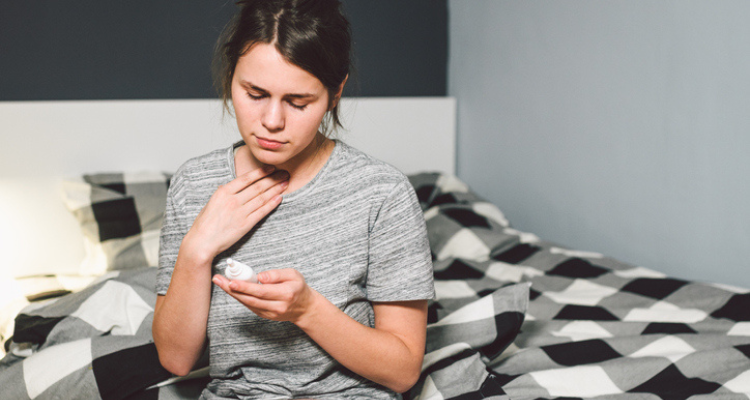
According to the American Sleep Association, nearly 70 million Americans suffer from a sleep disorder. From trouble falling or staying asleep to daytime sleepiness or tiredness after a full night’s rest, sleeplessness is becoming a nationwide epidemic.Unfortunately, poor sleep does more than just make you tired. Ongoing sleep troubles significantly impact immune function, contributing to poorer detoxification, cortisol regulation, and melatonin production, among other outcomes.*
A basic understanding of how the immune system works makes it clear why quality sleep is an essential part of boosting immune support.
immune system function 101
You probably know that the immune system’s role is to protect the body against invaders such as bacteria, viruses, toxins, fungi, and other harmful pathogens. It is a complex network of organs, vessels, proteins, and cells.
The two main parts of the immune system are the innate immune system (what you were born with) and the adaptive (acquired) immune system, which builds over time depending on your exposure to microbes and other compounds.
The adaptive immune system produces antibodies to protect against specific invaders, allowing the body to recognize these pathogens and defend against them. Along with antibodies, the primary components of your immune system include white blood cells, the lymphatic system, spleen, thymus, and bone marrow. White blood cells come in the form of lymphocytes (B cells, T cells, and natural killer cells) and other types of immune cells.[1]
White blood cell production and function take the biggest hit from inadequate sleep. Let's take a closer look at some critical ways the immune system is impacted by poor sleep.

genetics and sleep
Before considering how immune support depends on sleep, it’s worth mentioning that genetics play a role in how much sleep each person needs for optimal immune function. Recent studies have found a staggering 126 variations in 80 different genes that impact sleep duration.[2]
Most individuals still require the standard recommendation of 7-9 hours for the immune and other systems to function best. However, some need 10-11 hours, while a small subset can do well on as little as 4-5 hours.
the sleep-immune connection
Every bodily process needs time to rest and rejuvenate. The following five functions depend on proper sleep to carry out their immune support tasks.
detoxification
Crucial elements of the body’s detoxification processes are active during sleep. During restorative sleep, the detoxification system works to clear byproducts of neural activity that accumulate during the day. Some researchers refer to this system as the glymphatic system because it’s managed by glial cells and acts like the body’s lymphatic system at night, clearing toxins and waste products that could be precursors to neurological problems.[3]
Down-regulated detoxification has a significant impact on immunity. Poor sleep contributes to increased inflammatory pathways. An inferior ability to deal with environmental toxins has been shown to shrink the thymus gland, lessening the production of T cells, which have a crucial role in immune health.[4]
cortisol regulation
When you sleep, the entire system slows down. The cardiovascular system rests, and the endocrine system resets, including adrenal hormones, like cortisol. The HPA axis and cortisol production also get a much-needed reprieve, and cellular repair and regeneration occur.
Decreased sleep hugely increases cortisol levels, which suppress immune function.[5] One study found that people who slept an average of 4-6 hours per night had 72% fewer natural killer cells, leaving them more prone to illness.[6]
High cortisol levels can also deplete nutrients critical to the immune system like zinc, CoQ10, folic acid, and B vitamins.
melatonin production
The nighttime decrease in cortisol and increase in melatonin work together to boost immune support. Melatonin is sometimes referred to as the sleep antioxidant, as it powerfully acts to neutralize the harmful effects of free radical activity. It also helps regulate the inflammatory response, which directly connects with immune function.[7]
Liposomal melatonin is an especially effective form of melatonin due to its increased bioavailability.
immune memory
Another primary immune-related task is the body’s nocturnal database formation of pathogenic exposures known as immune memory. Much like how the brain consolidates memory and learning while asleep, the immune system logs how to recognize and protect against invaders.[8]
cytokine activity
Cytokines help the body respond to infections by regulating various aspects of immunity and the inflammatory response. Many different cell types produce these glycoproteins, but leukocytes are the most significant contributor. As such, cytokines significantly impact white blood cells, your frontline warriors against pathogens.
In the early stages of sleep, pro-inflammatory cytokine activity peaks, while anti-inflammatory cytokine activity peaks during the day. This pattern suggests that sleep plays a fundamental role in regulating cytokine activity and helps the distribution of T cells to the lymph nodes. More research is needed, but we know that the sleep-wake cycle affects cytokine production, impacting immune function.[9]
final thoughts: why sleep is critical for a strong immune system
Along with consequences of poor sleep like daytime drowsiness, reduced mental alertness and concentration, poor focus, and reduced motor function, inadequate sleep also profoundly impacts the immune system.
If you’ve already implemented sleep hygiene techniques and still struggle to get a good night’s rest, speak with an integrative doctor to look at the root causes of your sleep troubles.

[1] https://www.naturalmedicinejournal.com/journal/immune-system-integrative-perspective
[2] https://www.nih.gov/news-events/news-releases/sleep-or-not-researchers-explore-complex-genetic-network-behind-sleep-duration
[3] https://www.nih.gov/news-events/news-releases/brain-may-flush-out-toxins-during-sleep
[4] Park HY, Hertz-Picciotto I, Petrik J, Palkovicova L, Kocan A, Trnovec T. Prenatal PCB exposure and thymus size at birth in neonates in Eastern Slovakia. Environ Health Perspect. 2008 Jan;116(1):104-9. doi: 10.1289/ehp.9769. PMID: 18197307; PMCID: PMC2199273.
[5] Morey, J. N., Boggero, I. A., Scott, A. B., & Segerstrom, S. C. (2015). Current Directions in Stress and Human Immune Function. Current opinion in psychology, 5, 13–17. https://doi.org/10.1016/j.copsyc.2015.03.007
[6] Irwin M, Mascovich A, Gillin JC, Willoughby R, Pike J, Smith TL. Partial sleep deprivation reduces natural killer cell activity in humans. Psychosom Med. 1994 Nov-Dec;56(6):493-8. doi: 10.1097/00006842-199411000-00004. PMID: 7871104.
[7] Carrillo-Vico, A., Lardone, P. J., Alvarez-Sánchez, N., Rodríguez-Rodríguez, A., & Guerrero, J. M. (2013). Melatonin: buffering the immune system. International journal of molecular sciences, 14(4), 8638–8683. https://doi.org/10.3390/ijms14048638
[8] https://www.sciencedaily.com/releases/2015/09/150929142022.htm
[9] Besedovsky, L., Lange, T., & Born, J. (2012). Sleep and immune function. Pflugers Archiv : European journal of physiology, 463(1), 121–137. https://doi.org/10.1007/s00424-011-1044-0


















